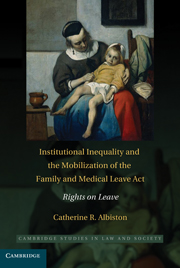Book contents
- Frontmatter
- Contents
- Preface
- Acknowledgments
- 1 Institutions, Inequality, and the Mobilization of Rights
- 2 The Social Institution of Work
- 3 Institutional Inequality and Legal Reform
- 4 Mobilizing the FMLA in the Workplace: Rights, Institutions, and Social Meaning
- 5 Mobilizing Rights in the Courts: The Paradox of Losing by Winning
- Conclusion
- Appendix A
- Appendix B
- References
- Index
- Cambridge Cultural Social Studies
2 - The Social Institution of Work
Published online by Cambridge University Press: 05 October 2010
- Frontmatter
- Contents
- Preface
- Acknowledgments
- 1 Institutions, Inequality, and the Mobilization of Rights
- 2 The Social Institution of Work
- 3 Institutional Inequality and Legal Reform
- 4 Mobilizing the FMLA in the Workplace: Rights, Institutions, and Social Meaning
- 5 Mobilizing Rights in the Courts: The Paradox of Losing by Winning
- Conclusion
- Appendix A
- Appendix B
- References
- Index
- Cambridge Cultural Social Studies
Summary
THE FAMILY AND MEDICAL LEAVE ACT (FMLA) REPRESENTS a significant change in family and disability policies, but these rights do not operate in a social vacuum. FMLA rights interact with informal norms, expectations, and practices that comprise modern workplaces. Some of these practices have become so taken-for-granted that it is hard for employers, courts, and even workers to imagine work being organized in any other way. Civil rights laws like the FMLA that set out to change established work practices often face resistance from the customs and informal expectations that constitute work. Even recognizing this resistance can be difficult because existing arrangements seem so natural, normal, and inevitable that they appear to be unchangeable reality, rather than workplace conventions.
A brief genealogy of work as a social institution can make the source of this resistance more visible and understandable (Dreyfus & Rabinow 1983; Foucault 1979). The purpose of genealogy is to investigate social categories such as work to uncover the historical struggles and events that give them shape and meaning (Dreyfus & Rabinow 1983). This analysis focuses on uncovering the relations of power embodied in the social practices and expectations that comprise work, especially on how standardized work practices relate to particular conceptions of gender and disability. Genealogy reveals that work, gender, and disability are not ahistorical or unchanging categories. It exposes how these concepts are socially constructed and give meaning to one another.
- Type
- Chapter
- Information
- Institutional Inequality and the Mobilization of the Family and Medical Leave ActRights on Leave, pp. 25 - 68Publisher: Cambridge University PressPrint publication year: 2010

